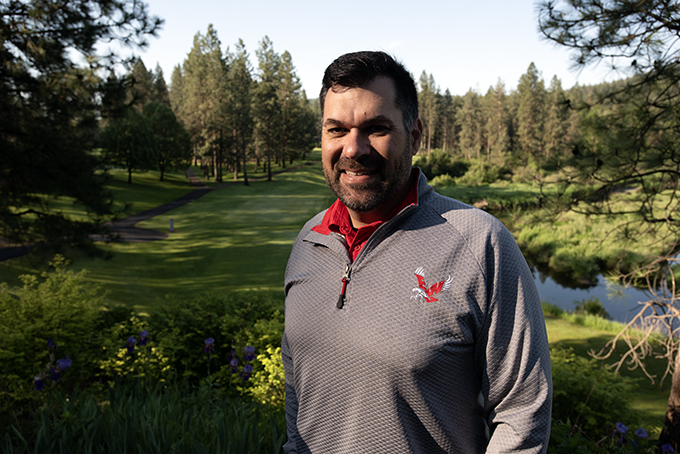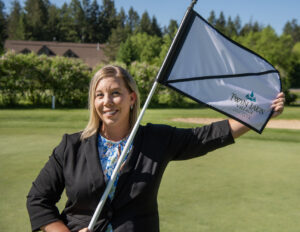By Melodie Little and Charles E. Reineke
When citizens of the far-flung Eagle nation return to Cheney for Eastern’s 100th Homecoming this fall, you can be sure that many, if not most, will be toting golf clubs. That’s not just because the game is popular — a National Golf Foundation survey found that 41.1 million Americans played at least one 18-hole round in 2022 — but because the Inland Northwest is an exceptional golfing destination.

Eastern alumni play an important role in keeping it that way, serving as club and course administrators, as well as staff and teaching professionals. It’s not easy. Conditions can be challenging, patrons demanding and hours long: working at play is, after all, still work. But for these talented professionals, no job could be better.
Just ask Paul Stringer ’79, a former Eagle golf-team standout who has pretty much done it all with, and for, the game. Over the course of his 35-year career, Stringer has served as a club professional, a course general manager, and, perhaps most consequentially, as an international course-design executive. With his Eagle alumna wife, Christie ’80, he has lived in China and Australia, while his work-related duties have taken him to nearly 90 countries.
These days, Stringer is the president of Nicklaus Design, the world’s leading golf course design firm. During its 50-year history, the company has built more than 435 courses in 46 countries, close to one percent of all the courses in the world.
At Nicklaus Design, he says, the goal has always been to realize the vision of founder Jack Nicklaus, who is widely acknowledged as both a master course designer and, arguably, the greatest golfer of all time. The company, like its founder, has long championed courses that are beautiful, challenging and fit within the natural terrain and environment of their locations.
“Many designers,” says Stringer, “have their own style. They’re artists, yes, but their golf courses tend to look similar. At Nicklaus Design, we embrace the topography, designing to the owner’s vision while working within environmental constraints to maximize players’ experience. This ensures that each of our courses is going to be totally unique.”
The stunningly varied landscapes of the Inland Northwest similarly represent the perfect opportunity for creating playable but challenging courses with jaw-dropping beauty. And across the region, Eastern alumni are committed to helping both visitors and club members make the most of these special locations.
“Once that spring clock hits, and the temperature is turned up to good golfing weather, Spokane is a golf town. It really is,” says Mark Poirier ’03, golf manager for Spokane Parks and Recreation.
Poirier oversees the City’s four municipal golf courses — Esmeralda, Downriver, Indian Canyon and The Creek at Qualchan — where eager local players and visitors from out-of-town logged some 172,000 rounds last year.

Esmeralda, with its lush, forgiving greens, is ideal for those who are relatively new to the game or want to play fast without a lot of hazards and bunkers. Downriver, the city’s oldest and busiest course, plays well for all ability levels.
The Creek at Qualchan, with its varied water features, and Indian Canyon, designed in 1930 and carved into a scenic hillside, are championship-style courses. In fact, Indian Canyon has, on multiple occasions, been listed in Golf Digest’s top 25 public courses in the country.
“We really do have a golf course for anyone. From the beginning golfer that has never touched a club, to the scratch handicappers, to the golf pro,” Poirier says.
Poirier found his way to EWU after former men’s golf coach Marc Hughes recruited him out of Wenatchee High School. Poirier accepted the scholarship and played for three years, until the program was discontinued in 2002.
Poirier says he practiced at all four of the courses he now oversees, not only honing his game but developing relationships that would later open doors: “I always thought to myself, ‘Gosh, this would be a pretty cool pace to work; this would be a pretty cool career — to be a golf pro.’”
Making his dream a reality involved, first, working as an assistant golf pro at The Creek at Qualchan, where he picked up hands-on management skills while working with Qualchan’s head pro, Mark Gardner. “You can’t beat real-world type of experience in that – and I felt fortunate to learn from one of the very best in the industry,” says Poirier.
Next up was a job managing North Idaho’s Highlands Golf Course, where he worked for nearly nine years before, in 2019, accepting the job in Spokane. These days, Poirier oversees contractual agreements for the city’s four managing pros, leads searches for new head professionals, and directs the course superintendents who, in turn, manage the grounds crews who ensure the courses look great and invite optimal play.
Serving in a role that advances golfing opportunities for an entire community, finding new and innovative ways to support youth golf, and connecting with people who also love the game: these are just some of the reasons that Poirier says it’s the best job he has ever had.
“I have a fun time coming to work every single day,” he says. “My focus is always on how we can make our product better, and serve the community better, each and every day.”
Local public course options aren’t limited to those run by the city. There are also three high-quality county-run courses: Latah Creek, MeadowWood and Liberty Lake.
“I call this the public golf-course Mecca of the U.S. It really is a cool place where people can come and play many different courses and still keep it way under $100 per course, per day,” says Bob Scott ’87, MeadowWood’s director of golf.

Scott is an unapologetic booster of the local scene. Spokane city and county courses, he says, offer quality golf at a bargain price due, in large part, to the public-private partnerships that set them apart.
The city and county, he explains, provide course maintenance, including top groundskeepers. Contracted club pros, meanwhile, lend their expertise in running the daily operations, as seasonal crews handle tee-times, league management, merchandise sales, restaurant operations and the myriad other tasks that keep facilities running smoothly.
Scott, who manages a crew of 28 at MeadowWood, a links-style course that caters to all skill levels, says EWU helped to ready him for the job: “My business degree really helped me, because as a golf pro here in Spokane — especially in the city and county courses — we’re independent contractors.”
Scott got his start in 1985, after he cajoled a gig from fellow Eagle and EWU Athletics Hall of Famer Gary Lindeblad ’72, then head golf pro at Indian Canyon. “I started bugging him, like in January, for a job,” says Scott, who, at the time, wanted to work in the industry because of the “free rounds of golf and range balls.”
At the urging of Lindeblad, whom he considers to be a mentor, Scott started on the path to become a golf professional in 1986 and completed the PGA program in 1989, soon after graduating. He continued at Indian Canyon before going to work at Liberty Lake Golf Course and then, crossing the street, to work at MeadowWood,
Last year, golfers played about 40,000 rounds at MeadowWood, says Scott, who is never shy about crediting his crew and course superintendent. “The conditions are always good,” he says. “The speed of play is always excellent.”
A quick, 30-minute drive across Washington’s border leads to Rathdrum, Idaho, where another Eagle, Jennifer Dolph ’03, is making her own mark on the industry. Dolph, one of nation’s few women working as a club-managing pro, oversees the operation at Twin Lakes Village, a community that includes 360 private homes and a public course.
A golf pro since 2003 and a PGA member since 2008, Dolph played on the EWU women’s golf team from 1999-2003 while studying recreation management. “In the very first class [the professor] said, ‘If you are here to make money, leave now. If you are here to do what you love, please stay,’” Dolph says. “That has held true throughout my entire career, and all of the different decisions that I’ve made,” says Dolph, who today manages a team of 40 mostly seasonal employees.

Playing on EWU’s women’s golf team also had an influence. She recalls an inspirational moment when her team was working out in the weight room and members of Eagle football team came in to exercise. Not only were the guys amazed to see the women golfers lifting weights, they complimented them on their hard work.
“It was kind of a light bulb moment,” Dolph says. “Other people don’t always see the work you put in — sometimes golf is a sport that people associate with drinking beer and driving carts.”
After graduation, Dolph taught golf to young campers in Massachusetts, coached collegiate golf at the University of California, Riverside, served as a regional director of golf and managed clubs across the country. When she accepted the position at Twin Lakes Village, Dolph, who grew up in Pullman, felt like she was coming home. “It’s a small [golf pro] community in a big world. To have people who I played with back in the day — Trevor Fox is down at Black Rock and Mark Poirier with the Spokane courses — it is definitely really cool.”
Dolph’s former Eagle golf partner, Trevor Fox ’02, has carved out his own successful niche in the hills above Lake Coeur d’Alene.
Fox is the director of golf at The Golf Club at Black Rock, a private club with roughly 280 members (certain celebrities-who-must-go-unnamed among them).
Fox, who got his start at Indian Canyon, has been a professional for close to 20 years. He says he can think of half-a-dozen team members who are professionals working in the immediate area. “It’s kind of interesting to have that many in the area who were on the Eastern team at a certain point,” he says.
Although Black Rock routinely makes top 100 lists for private courses, it has a laid-back, summer-camp vibe.
“It’s one of few top golf clubs where T-Shirts, flip flops and board shorts are okay,” Fox says. “That’s because of the lake. We call it North Idaho casual, and just really try to let our members enjoy themselves. We want them to feel like they are on vacation all of the time.” Black Rock is, in fact, like its own little resort town. As such, Fox and his team of roughly 25 employees often find themselves providing services that go well beyond typical golf-pro duties.
And while his time playing the Jim Engh-designed course never fails to excite, Fox says his favorite part of his job is the membership and staff at Black Rock.
“It is very much a family atmosphere,” Fox says, adding, “It’s a heck of a spot and I’m very lucky to be where I am.”
That sentiment is one shared by Eagle pros working at clubs and on courses across the nation. “Lucky” also describes, of course, those golfers fortunate enough to drive, chip and putt their way through these places that EWU alumni make so special.
Our list of additional Eagle alumni who serve as industry professionals is coming soon. Know someone you’d like to see recognised? Let us know at easternmagazine@ewu.edu